24 Starting Your Future
Congratulations, you’ve just accepted an offer of employment. You nailed that interview (or interviews) and accepted they job offer that followed. Now you’re embarking on the exciting journey from the world of study to the jungle of employment. This might be your first SERIOUS job, so what do you have to do to start to survive becoming a professional? What survival skills will you need, see figure 24.1. Even better, how can you thrive in your new role and take on the challenges that are coming your way? How will you avoid diving, ensuring you survive and hopefully thrive in your new environment? 💪
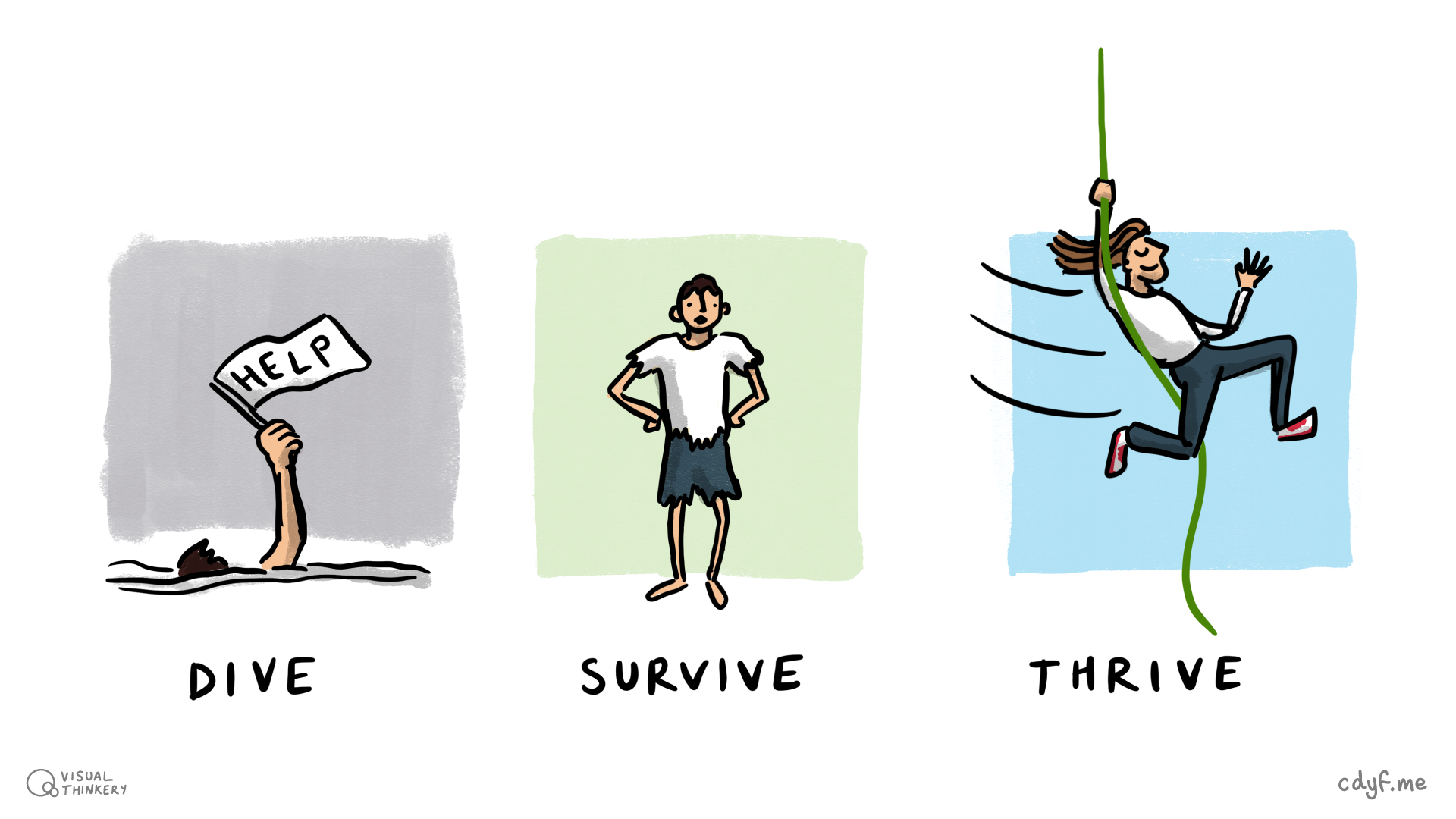
Figure 24.1: Will you dive, survive or thrive in your new working environment? The world of employment can be a bit of a jungle where you struggle for existence. What survival skills will you need to avoid diving (left) and how can you move beyond merely surviving (middle) towards positively thriving as a professional (right)? Jungle survival sketch by Visual Thinkery is licensed under CC-BY-ND
Your future is bright, your future needs starting, so let’s start your future.
24.1 What you will learn
At the end of this chapter you will be able to
- Manage your manager so that you can:
- Survive the workplace
- Thrive in the workplace
- Avoid diving in a workplace environment
- Collect evidence of new workplace skills and knowledge that you develop
- Reflect on new workplace skills and knowledge that have developed now …
- … and in the future
24.2 Survive, thrive or dive?
Starting a new job is a bit like starting a new relationship, except that it is professional rather than romantic one. You’ve searched for and found a partner. If this had happened on Tinder, your employer “swiped right” on your profile because they liked the look of you. You’ve both been through the courtship of recruitment. Your courting may have been quick or you may have had many rounds of first and second “dates”, known as interviews. Now that your are starting contractual employment, you are both committed to each other in a serious relationship. Simply put, there are three scenarios for you as a new employee:
- You’ll survive
- You’ll thrive
- You’ll dive
24.2.1 Survive
Your new job will go OK, you’ll meet the expectations of your employer and become and valued employee. If your employer has a probationary period, you’ll pass your probationary review without any problems. Most employees probably fit in to this category. 🆗
24.2.2 Thrive
Your new job will go brilliantly, you’ll exceed the expectations of your employer. If you’re on a fixed term contract, such as a summer internship or year long placement, they’ll make you a job offer during or soon after your contract of employment expires. If you’re on a more permanent contract, such as a graduate job or graduate scheme you’ll be promoted, given a pay rise and more responsibility. 💪
You’re doing really well if you can impress your manager. Some lucky people make it into this category.
24.2.3 Dive
Your new job will go badly, you will struggle to fit in and won’t meet the expectations of your employer. Once you were like star-crossed lovers, (see figure 24.2) but the relationship has turned sour and could take a disastrous dive into tragedy. (Shakespeare 1597; Goble and Wroe 2004)
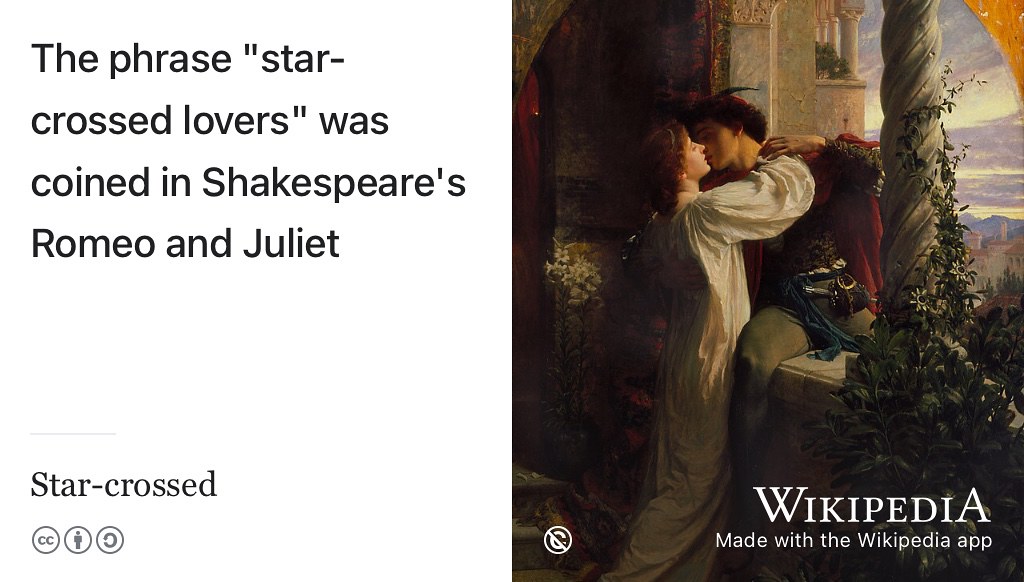
Figure 24.2: Your relationship with your employer is obviously a professional one rather than a romantic one, but that doesn’t mean it can’t end in tragedy like Shakespeare’s star-crossed lovers in Romeo and Juliet. (Shakespeare 1597) What can you do to keep your relationship with your employer healthy and happy? Public domain image of a painting of Romeo and Juliet by Frank Dicksee via Wikimedia Commons w.wiki/3DfJ adapted using the Wikipedia app
There are several relationship problems that could lead to you breaking up with (or being dumped by) your newly estranged “lover”. 💔
- Relationship problems: Your relationship with your manager(s) is not going well. You’ve tried solving problems informally by talking to your manager but you’re not satisfied with the response and want to raise a formal grievance complaint in writing. (Servant 2025f)
- It’s not you, it’s me: You might ultimately decide to you want to hand in your notice to terminate your contract of employment and leave. (Servant 2025d)
- It’s not me, it’s you: If things get really bad, your employer may take disciplinary action against you (Servant 2025a) and in the worst case scenario, you’ll be fired (dismissed). (Servant 2025c)
- Becoming unhappier: You were looking for a job and now you’ve found a job. Heaven knows you’re miserable now. (Marr and Morrissey 1984) Perhaps you’re not being challenged enough or given too much work that you’re not interested in? Perhaps the honeymoon period is over, you’ve experienced hedonic adaptation and start to get disillusioned? (Santos 2022b)
In the UK, dismissal is rare, but it does happen, even to interns and placement students. In this scenario in the UK, the employer has a duty to do everything they reasonably can to prevent this from happening. It’s not in your employers interests to fire you because they’ve invested a lot of time and money in you by this point. If they have sensible recruitment procedures, those procedures will root out unsuitable candidates long before they make it to the workplace where they can cause real and lasting damage to the organisation once in post.
All employers have procedures for making sure that you can agree on work that suits both of your needs. Better employers will have better procedures to ensure this happens. Employers don’t want their employees to “dive” and will try prevent this from happening wherever possible. So, speak to your manager(s) and keep the communication channels open as you navigate the transition from student to professiona.
24.3 From Student to Professional
So you’re starting a new job? Perhaps you’re doing a summer internship, going on a placement year (Petrescu 2025) or you’ve landed a shiny new graduate job? What changes will you have to adapt to as you transition from Student to Professional? Gradconsult have analysed ten of the most common transitions you’re likely to encounter while adapting from student life to professional life. (Fielding 2025a, 2025b) The key differences between being a student and employee that they identified are:
- Pragmatism: changing from perfection to efficiency
- Fortitude: changing from failure avoidance to inevitable failure
- Task navigation: changing the way you manage your time
- Accountability: changing from a consumer to a producer
- Professional interaction: changing from friends to colleagues
- Career navigation: changing from structured to unstructured
- Diverse collaboration: changing the diversity of your collaborators
- Self assessment: changing the way you are assessed
- Self sufficiency: changing who you are dependent on
- Wellbeing: changing how your wellbeing and social life are provided for
These ten transitions from education to employment are illustrated in figure 24.3.
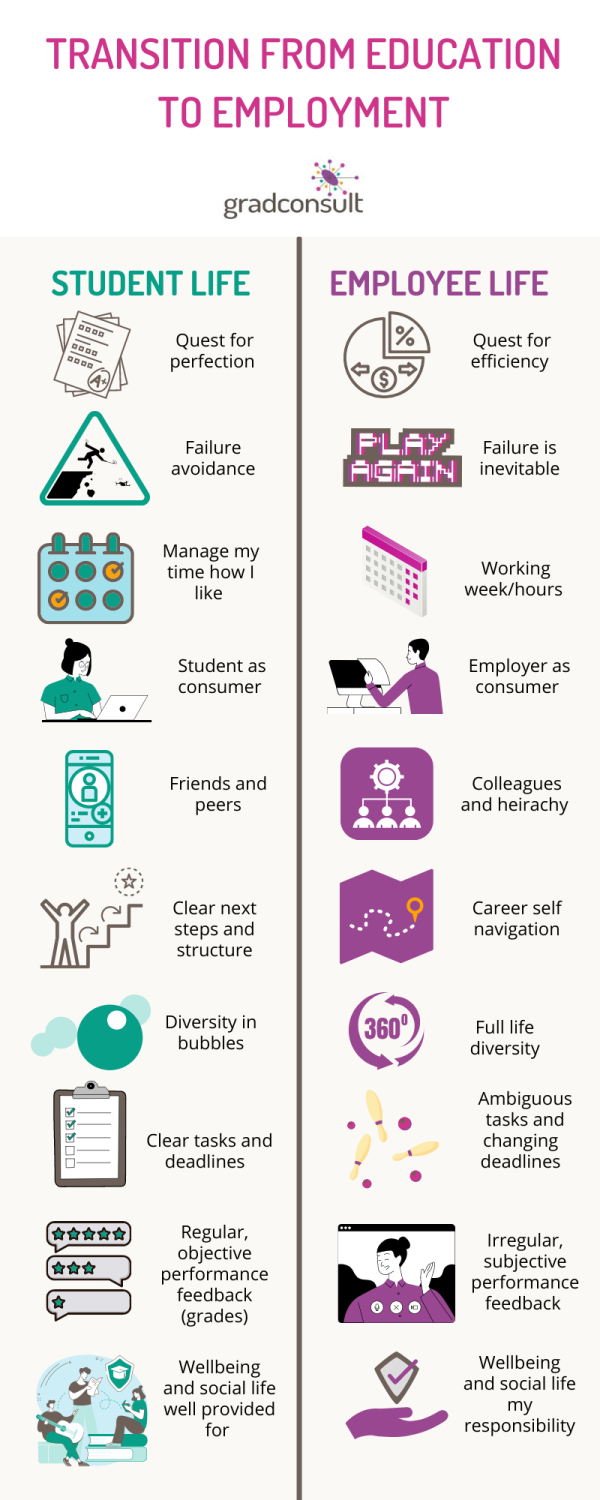
Figure 24.3: Ten changes you’re likely to encounter on your journey from student to professional. Image reproduced from an article on the transition from education into employment by Rebecca Fielding (with permission) (Fielding 2022)
As you prepare for the workplace and start your job, it’s useful to regularly reflect on each of these nine challenges you’re likely to face and ask yourself support you need to manage them. Which of the nine are going to be top of your list?
Managing these changes means building a good relationship with your manager, if this is your first job, you may not have had a manager before so let’s talk about managing your manager.
24.4 Managing your manager
Building a good relationship with your manager(s) will be key to determining which of the dive, survive or thrive scenarios above plays out. At University, you didn’t have a manager. Yes you had deadlines, but you didn’t have a boss. That changes when you’re an employee so it’s in your interests to understand what your boss expects of you.
Software engineer Julia Evans has authored a series of programming zines, there’s one called HELP! I have manager! (Evans 2018) you might find useful. It will help you understand your managers job better so that you can work together more effectively. It will help you survive and thrive, not dive because it covers:
- understanding your manager’s job
- setting clear expectations
- talking about problems early
- reviewing performance and getting promoted
- asking for specific feedback
The zine has the benefit of being aimed at engineers just like you. Thoroughly recommended! You might also enjoy Julia’s other more technical zines such as:
24.5 Stay in school
As you develop new skills and knowledge at work, it is a good idea to collect evidence of what you’ve done. Whatever your career path, you’ll need to keep your CV updated. One way to think of the evidence is as badges, digital or otherwise. Your employer may already have training schemes that recognise and reward your accomplishments. These badges may be generic or specific to the particular sector you are working in. See chapter 25 on Achieving your future for more details.
24.5.1 Technical badges
Some examples of technical badges are show in figure 24.4.
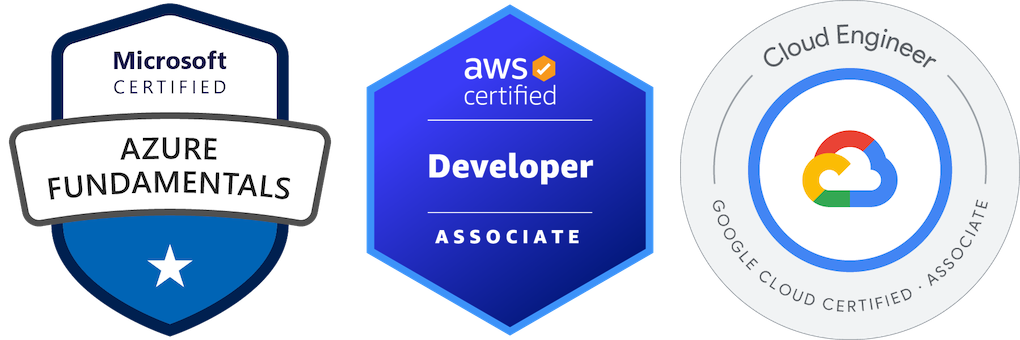
Figure 24.4: Three examples of commercial digital badges from providers of cloud services from left to right: (1) Microsoft fundmentals see section 25.4.1 (Nadella 2025) (2) Amazon Web Services badge awarded by credly.com for an AWS certified developer (Bezos 2025a) and (3) Google Cloud Platform (GCP) (Soss and Vergadia 2022) Each provider offers accreditation for pre-professionals tailored towards technical students. For Microsoft, they are called fundamentals, (Nadella 2025) for Amazon and Google they are typically called foundational or associate qualifications. (Pichai 2025) Your University32 and/or employer may provide support for you to achieve these certifications during your academic study, internship, placement or as a recent graduate. The exams typically cost around $100 each to take and around 20 hours of online study time. Some qualifcations are available through LinkedIn Learning, see https://www.linkedin.com/learning/topics/cloud-computing-5
There are many kinds of technical badge available besides the three shown in figure 24.4. In some cases, your employer might encourage or pay for you to study and get technical certifications.
24.5.2 Non-technical badges
You are more than just a techie, so make sure you develop your non-technical skills as well. We introduced softer skills in chapter 4, but there’s plenty of other skills to think about:
- Building resilience
- Negotiating and managing conflict
- Leadership, influence and change
- Having difficult conversations
- Emotional intelligence
- Public speaking
- Active listening
24.5.3 Lifelong learning
There are many platforms for building your skills and knowledge during and after your formal education, some examples include:
- codecrafters.io, see section 8.7.5
- coursera.org
- edx.org
- egghead.io
- futurelearn.com
- khanacademy.org
-
linkedin.com/learningsee bit.ly/linkedin-learning-manchester - open.edu/openlearn
- pluralsight.com
- skillshare.com
- udemy.com
- youtube.com etc
The choice of lifelong learning can be bewildering. Some platforms provide free resources, others do not, but your employer may already pay for some services making them free to you while you are an employee. If that’s the case, make good use of the services while you can. There’s a useful comparison of four different online learning platforms here. (Pugachevsky 2021)
24.5.4 Other training courses
Your employer may provide other courses you can go on. Again, you should make the most of these if and when they are available.
Whatever job you’re doing, stay in school. Take advantage of any training on offer or go and find courses that help you develop professionally and personally. Remember that you are the person who cares most about your career, see section 1.5.
24.6 Breakpoints
Let’s pause here. Insert a breakpoint in your code and slowly step through it so we can examine the current values of your variables and parameters.
Besides collecting evidence and managing your manager, you need to manage yourself too. A proven way to do this is to periodically reflect on your work. Your employer may have procedures to help you do this, such as performance reviews or one-to-ones with your manager on a regular basis. Whatever the setup, you will benefit from taking time to reflect on:
- What have you been doing?
- WWW: What Went Well?
- EBI: Even Better If?
24.6.1 What have you been doing?
Briefly describe your roles and responsibilities. What projects have you worked on? What were the main technologies that you used? As well as describing this to colleagues, you should aim to communicate this with non-specialists, people outside your field. How would you describe your job to your friends and family and terms they would understand?
24.6.2 WWW: What went well?
Are there any projects you are particularly proud of? What new knowledge or skills have you learned or improved? Remember to include both non-technical as well as technical aspects of your job. Non-technical skills include organisation, time-management, confidence, communication etc. What did you think about these achievements and how do they make you feel? What have you learned?
24.7 Reflecting your future
The WWW/EBI activity in the breakpoint above is an example of reflective writing. You may have come across this already, but developing the ability to reflect is a key skill in:
- learning how to learn
- learning how to think more critically
The video in figure 24.5 summarises what reflection is and why its important to your future.
Figure 24.5: Reflective writing puts into writing your reflective thinking in a three stage process: 1) looking back 2) analysing 3) projecting into the future. This video explains why reflection is an important critical thinking skill that will help you progress in the future. You can also watch the 6 minute video embedded in this figure at youtu.be/BYUy1yvjHxE. (Advisor 2014)
24.8 Summarising Your Future
Too long, didn’t read (TL;DR)? Here’s a summary:
Your future is bright, your future needs starting. Starting your future is the first step of deploying your future. Deploying your future is coding your future.
Making the transition from education to employment can be a big and daunting change, see figure 24.3. To make the change as smooth as possible, you may need to readjust your expectations because being a student is very different to being an employee. Some key differences include:
- You have a manager when you are an employee, who you need to maintain a good working relationship with
- Your performance is much more dependent on other people (your colleagues), unlike in education where you can often work more independently (e.g. when completing coursework or revising for an exam)
- You get paid, which hopefully makes it all worthwhile!
Some of the keys to surviving your future are therefore:
- Communicating early and often with your manager(s) about any issues you have in the workplace, see section 24.4
- Regularly reflecting on your progress, with and without your manager, see section 24.7
- Understanding that working with people is challenging for everyone, and enjoyable for many, see figure 24.6
- Being aware of the transitions you’ll need to adapt to, see figure 24.3
- Staying in school. Despite leaving formal education, you should never stop learning, see section 24.5
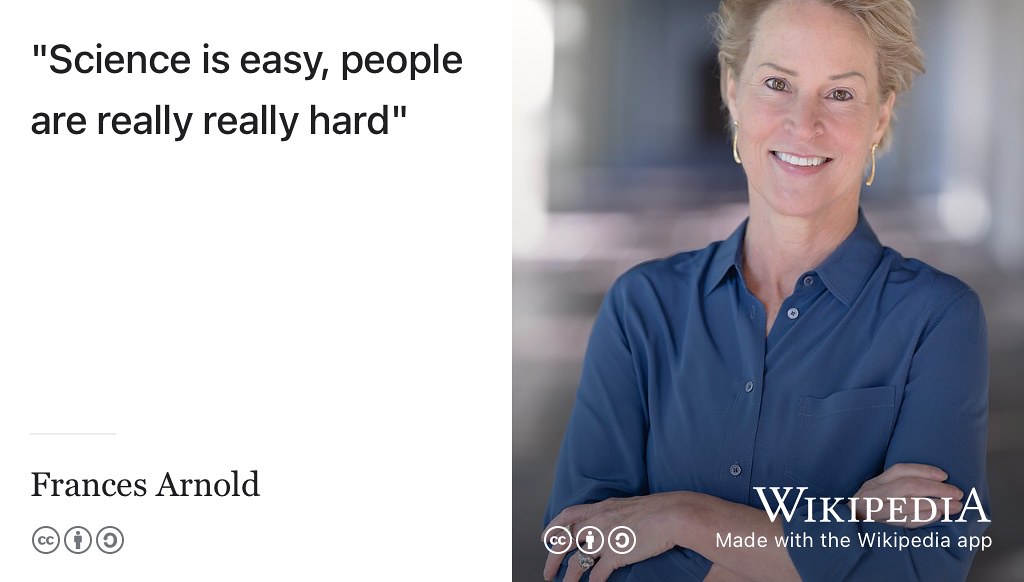
Figure 24.6: Compared to Science, people can be really really hard work! (Al-Khalili 2022) Compared to technology, engineering and mathematics, people can be really hard work too. Collaborating closely with people (your colleagues) is a key difference between your education and employment. Thankfully, people can also make your employment more enjoyable and rewarding than academic study, provided you pick your colleagues carefully, see section 11.2.8. CC BY-SA portrait of Nobel laureate Frances Arnold in 2021 at Caltech by Christopher Michel via Wikimedia Commons w.wiki/6V5K adapted using the Wikipedia app
In the next part, chapter 25: Achieving your Future we’ll look at evidence you can collect that you’ve not merely survived, but thrived in your new job and that this stage is just the start of your promising career.